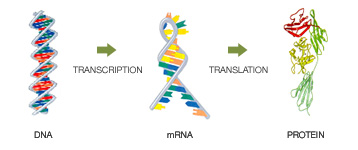
MESSENGER RNA (mRNA) - Role and Significance
Virtually all human diseases are associated with inadequate or inappropriate protein production. For example, diseases such as Parkinson’s or muscular dystrophy are due to inadequate amounts of protein being available, whereas in inflammation or cancer high levels of inappropriate proteins may be produced. The information that enables the human body to produce proteins in the correct amount and at the appropriate time is contained in the human genome, which comprises the 46 chromosomes in the nucleus of human cells and contains a collection of approximately 30,000 genes. Genes are comprised of DNA that is uniquely built up from a series of nucleotides and are the code for proteins. The precise sequence and repetition of bases within the nucleotide chain in each gene is the blueprint for the information used during protein synthesis.

Protein synthesis typically involves a two-phase process: transcription (or copying) of a “formula”, followed by translation (or manufacture) of a protein. The formula for the protein information is contained in the nucleotide strands of the gene. During transcription, this is copied from the sense strand of the DNA, into one or more molecules known as messenger RNA, or mRNA. The information, then encoded in the mRNA, is sent to the cytoplasm where it is decoded by ribosomes and translated into the sequence of amino acids that comprise the required protein. The mRNA can be repeatedly translated, giving rise to multiple copies of the same protein.
As long as it is present, mRNA will continue to be translated into a protein. However if a fault occurs in the mRNA code, then gene expression may result in the wrong protein or no protein at all. Similarly, if mRNA continues to be present when it is not required, then inappropriate or over-production of protein can occur.
The cell can control the presence of the mRNA by modulating its stability or half-life. If the mRNA is stabilised, the amount of mRNA increases and protein is produced. If the mRNA is de-stabilised and de-graded then protein production is switched off and no protein is produced
 fault in the “code” = nil or the wrong protein at any time
fault in the “code” = nil or the wrong protein at any time
 “code” remains switched on = right protein but at the wrong time
“code” remains switched on = right protein but at the wrong time
Current drugs mainly act by functionally inhibiting disease-causing proteins (for example by neutralizing them with antibodies, soluble receptors, or small molecules). Modulation of mRNA enables inhibition of disease-causing proteins at the level of the mRNA, or the stimulation of beneficial proteins if required.
